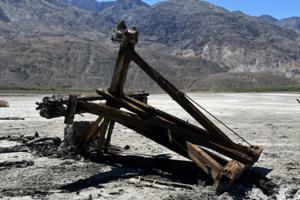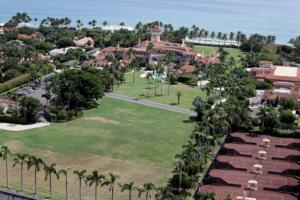Current News
/ArcaMax

Airline passengers crack 'code' by claiming to need wheelchairs, report says
Southwest Airline passengers have “cracked a code” allowing them to subvert the travel provider’s boarding rules by claiming to need wheelchairs.
A report on airline site View From the Wing alleges 30 passengers claimed to need wheelchairs on a recent flight between Florida and Puerto Rico. When the plane landed, 28 of those travelers ...Read more

California's popular El Capitan State Beach to close for yearlong construction
LOS ANGELES — Overnight campers won't be able to stay at El Capitán State Beach starting next month as the park undergoes a yearlong construction project.
The state beach, located off the 101 Freeway just 30 minutes north of Santa Barbara's downtown, features 132 standard campsites, five group sites and spaces for hike-and-bike campsites.
...Read more

Plane crash prompts South Korea leaders to pause political fight
SEOUL, South Korea — After two leaders were impeached in as many weeks, a deadly plane crash has prompted South Korea’s feuding political camps to temporarily halt a protracted power struggle.
In the immediate aftermath of the Jeju Air flight crash on Sunday, which killed all but two of the 181 people onboard, South Korea’s rival ...Read more

Musk berated by German leaders over backing for far-right party
German Chancellor Olaf Scholz and his deputy, Robert Habeck, used their New Year addresses to castigate Elon Musk over his backing for a far-right party in February’s snap election.
Musk, a key adviser and major donor to U.S. President-elect Donald Trump, has repeatedly praised the anti-immigrant Alternative for Germany in recent weeks on his...Read more

Liam Payne was dropped by his psychiatrist before his death, report says
Liam Payne’s psychiatrist reportedly dropped the One Direction singer before his frantic drug-related death in Argentina because the 31-year-old pop star needed a “higher level of care” than she could give him.
In a legal document obtained by TMZ, a therapist who’d been working with Payne before his fatal plunge from a hotel balcony in ...Read more

'Gone Girl' kidnapper charged with Bay Area home invasions from 2009
SAN JOSE, Calif. — Matthew Muller, who is serving simultaneous prison sentences for kidnapping and raping a Vallejo woman in a case that drew international infamy after police wrongly accused the victim of fabricating the ordeal, is now being charged with home invasions in Mountain View and Palo Alto reported years earlier.
Authorities say ...Read more

Minnesota city awarded $1 million state grant for planned pig-to-human transplant center
MINNEAPOLIS — The state Department of Employment and Economic Development has awarded a southeastern Minnesota city a $1 million grant to support the state’s first pig-to-human transplant center.
Stewartville will use the funding, announced Monday, to construct streets and public utilities around the Schumann Business Park, the future home ...Read more

Nevada US attorney nominated by Biden to step down prior to Trump's inauguration
LAS VEGAS — The top U.S. law enforcement official in Nevada, who was nominated by President Joe Biden, is stepping down from his position shortly before President-elect Donald Trump takes office.
U.S. Attorney Jason Frierson’s last day is Jan. 17, three days before Trump’s inauguration, his office announced Monday.
Frierson, a Democrat, ...Read more

Wash. Gov. Jay Inslee's budget proposal would delay state child care expansion
SEATTLE — More Washington children are expected to qualify for public child care and preschool programs in 2025 and 2026.
But in the final weeks of his administration, Gov. Jay Inslee has proposed a budget that could delay the expansions for several years.
Although it will be months before state lawmakers finalize the budget, Inslee's ...Read more

China fights rumors of panda abuse at US zoo in sign of goodwill
China cracked down on rumors that a Washington, D.C., zoo abused its pandas, as it seeks to steady ties with the United States weeks before President-elect Donald Trump is set to return to the White House.
Police in Sichuan accused two people of spreading false information that the bears, Mei Xiang and Tian Tian, were mistreated at the National...Read more

US Treasury says it was breached by Chinese-backed hacker
The U.S. Treasury Department was hacked by a Chinese state-sponsored actor through a third-party software service provider, according to a letter the agency sent to Congress on Monday.
Treasury described the intrusion as a “major cybersecurity incident,” since it was attributed to a state-sponsored actor, according to the letter, which was ...Read more

How a stowaway boarded a Honolulu Delta flight at Sea-Tac Airport
SEATTLE — Hours before she boarded a flight to Honolulu without a ticket on Christmas Eve, the woman who has become known as the “ Delta stowaway” walked through Seattle-Tacoma International Airport barefoot with a bottle of alcohol and got in line to board at least two other flights.
Shemaiah Patrice Small, 33, did this without a ...Read more

Former Minneapolis police union head Bob Kroll seeking Donald Trump's nomination to be U.S. Marshal
Bob Kroll, the outspoken and incendiary former Minneapolis police union leader, is seeking President-elect Donald Trump’s nomination to be Minnesota’s next U.S. marshal, according to documents obtained by the Star Tribune.
Kroll is banned from serving as a law enforcement officer in three of the state’s most populous counties for 10 years...Read more
News briefs
Biden orders ‘National Day of Mourning’ for Carter
President Joe Biden on Monday ordered federal offices closed and gave government employees the day off to observe the Jan. 9 funeral of former President Jimmy Carter, which Biden has proclaimed as a “National Day of Mourning.”
Carter passed away Sunday at the age of 100, after serving ...Read more

Federal judge greenlights NYC congestion pricing despite New Jersey environmental concerns
NEW YORK — In an eleventh-hour ruling, a federal judge in New Jersey allowed MTA officials to press forward with congestion pricing in midtown Manhattan next week, but said regulators have two weeks to spell out their plans to offset expected pollution increases in New Jersey from changing traffic patterns.
Judge Leo Gordon wrote in an ...Read more

Sheriff in Michigan's Oakland County calls for lawmakers, judges to rethink early release policies
DETROIT — Oakland County Sheriff Mike Bouchard is urging legislators and judges to rethink laws and policies that let some violent offenders out of prison on parole after authorities said a man with a lengthy history of convictions went on a crime spree Christmas Eve that left one woman dead.
Malik Webb had just been released from prison on ...Read more

Death Valley's historic salt tower toppled by park visitor is being repaired
The National Park Service has started a project to stabilize a group of 113-year-old wooden towers inside Death Valley National Park.
Two leaning towers have been straightened, the agency announced Monday, but repairs have yet to begin on a tower that was knocked down in April by a park visitor who was trying to free a vehicle that was stuck in...Read more

Chinese hackers stole documents, accessed workstations in 'major incident,' Treasury Department says
Chinese hackers accessed workstations and stole documents in a “major incident” earlier this month, the Treasury Department announced Monday.
In a letter to the leaders of the Senate Banking, Housing and Urban Affairs Committee, assistant secretary for management Aditi Hardikar wrote that the state-sponsored hackers compromised a third-...Read more

Elon Musk living in $2K per night Mar-a-Lago cottage, report says
Elon Musk is reportedly staying in a cottage at President-elect Donald Trump’s estate that rents for $2,000 a day.
The world’s richest man, who holds substantial government contracts and appears to have spent more than a quarter of a billion dollars to get Trump and his surrogates elected to office, has been a Trump tenant since the ...Read more

Home tax bills to rise in Maryland, as residential and commercial property values climb 20%
BALTIMORE — Property tax assessments in Maryland will climb in 2025, reflecting the state’s tight housing inventory and rising home prices and leading to higher tax bills for many owners.
The total assessed value on residential and commercial property around the state rose a combined 20.1% over three years, according to the State Department...Read more
Popular Stories
- Leaked documents show Cuban military sitting on billions of dollars amid humanitarian crisis
- Man slashed in neck inside Manhattan subway station, suspect nabbed
- Plains remembers Jimmy Carter as 'the best ex-president we've ever had'
- Baltimore buildings reopen after Legionella mitigation
- Elon Musk living in $2K per night Mar-a-Lago cottage, report says





